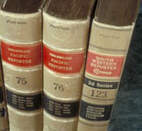39-17-1307 - Unlawful carrying or possession of a weapon
(a)
(1) A person commits an offense who carries, with the intent to go armed, a firearm or a club.
(2)
(A) The first violation of subdivision (a)(1) is a Class C misdemeanor, and, in addition to possible imprisonment as provided by law, may be punished by a fine not to exceed five hundred dollars ($500).
(B) A second or subsequent violation of subdivision (a)(1) is a Class B misdemeanor.
(C) A violation of subdivision (a)(1) is a Class A misdemeanor if the person's carrying of a handgun occurred at a place open to the public where one (1) or more persons were present.
(b)
(1) A person commits an offense who unlawfully possesses a firearm, as defined in § 39-11-106, and:
(A) Has been convicted of a felony crime of violence, an attempt to commit a felony crime of violence, or a felony involving use of a deadly weapon; or
(B) Has been convicted of a felony drug offense.
(2) An offense under subdivision (b)(1)(A) is a Class B felony.
(3) An offense under subdivision (b)(1)(B) is a Class C felony.
(c)
(1) A person commits an offense who possesses a handgun and has been convicted of a felony unless:
(A) The person has been pardoned for the offense;
(B) The felony conviction has been expunged; or
(C) The person's civil rights have been restored pursuant to title 40, chapter 29, and the restoration order does not specifically prohibit the person from possessing firearms.
(2) An offense under subdivision (c)(1) is a Class E felony.
(d)
(1) A person commits an offense who possesses a deadly weapon other than a firearm with the intent to employ it during the commission of, attempt to commit, or escape from a dangerous offense as defined in § 39-17-1324.
(2) A person commits an offense who possesses any deadly weapon with the intent to employ it during the commission of, attempt to commit, or escape from any offense not defined as a dangerous offense by § 39-17-1324.
(3)
(A) Except as provided in subdivision (d)(3)(B), a violation of this subsection (d) is a Class E felony.
(B) A violation of this subsection (d) is a Class E felony with a maximum fine of six thousand dollars ($6,000), if the deadly weapon is a switchblade knife.
(e)
(1) It is an exception to the application of subsection (a) that a person is carrying or possessing a firearm, loaded firearm, or firearm ammunition in a motor vehicle or boat if the person:
(A) Is not prohibited from possessing or receiving a firearm by 18 U.S.C. § 922(g) or purchasing a firearm by § 39-17-1316; and
(B) Is in lawful possession of the motor vehicle or boat.
(2)
(A) As used in this subsection (e):
(i) “Boat” means any watercraft, other than a seaplane on the water, designed and used primarily for navigation or transportation on the water; and
(ii) “Motor vehicle” has the same meaning as defined in § 55-1-103.
(B) This subsection (e) shall not apply to a motor vehicle or boat that is:
(i) Owned or leased by a governmental or private entity that has adopted a written policy prohibiting firearms, loaded firearms, or firearm ammunition not required for employment within the motor vehicle or boat; and
(ii) Provided by such entity to an employee for use during the course of employment.
(f)
(1) A person commits an offense who possesses a firearm, as defined in § 39-11-106(a), and:
(A) Has been convicted of a misdemeanor crime of domestic violence as defined in 18 U.S.C. § 921, and is still subject to the disabilities of such a conviction;
(B) Is, at the time of the possession, subject to an order of protection that fully complies with 18 U.S.C. § 922(g)(8); or
(C) Is prohibited from possessing a firearm under any other state or federal law.
(2) If the person is licensed as a federal firearms dealer or a responsible party under a federal firearms license, the determination of whether such an individual possesses firearms that constitute the business inventory under the federal license shall be determined based upon the applicable federal statutes or the rules, regulations and official letters, rulings and publications of the bureau of alcohol, tobacco, firearms and explosives.
(3) For purposes of this section, a person does not possess a firearm, including, but not limited to, firearms registered under the National Firearms Act (26 U.S.C. § 5801 et seq.), if the firearm is in a safe or similar container that is securely locked and to which the respondent does not have the combination, keys or other means of normal access.
(4) A violation of subdivision (f)(1) is a Class A misdemeanor and each violation constitutes a separate offense.
(5) If a violation of subdivision (f)(1) also constitutes a violation of § 36-3-625(h) or § 39-13-113(h), the respondent may be charged and convicted under any or all such sections.
Range of Punishment for Felonies & Misdemeanors, T.C.A. § 40-35-111
|





